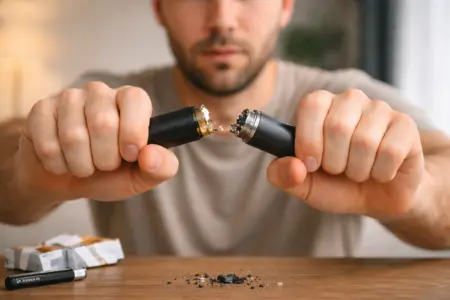Detoxing from Opiates | Drug Withdrawal | Which Drugs Do We Treat?
Living With Chronic Pain and Addiction
For many people, prescription painkillers are first prescribed to manage genuine, long-term pain. But over time, reliance on these medications can turn into addiction, leaving patients caught between two fears:
- “What will happen to my pain if I stop taking medication?”
- “What will happen to me if I keep taking it?”
At Castle Craig, we specialise in helping patients break free from painkiller dependence while still finding safe, effective ways to live with chronic pain.
Many people who enter residential rehab are struggling with an addiction to painkillers prescribed for chronic pain. Opioids and certain other medications can be highly addictive – including codeine, dihydrocodeine, morphine, oxycodone, pregabalin, gabapentin, fentanyl and buprenorphine.
Research shows that these drugs are not always the most effective way to manage pain in the long term, and over time they can cause more harm than good. Relying on painkillers in the long-term can create a cycle of worsening pain sensitivity, growing tolerance, and eventually addiction. Patients often feel trapped – unable to stop the medication but also unable to live fully with it. That’s why at Castle Craig we offer specialist support for people whose chronic pain is complicated by painkiller dependence.
The Impact of Chronic Pain
Symptoms and effects of chronic pain:
Chronic pain affects more than the body – it disrupts daily life and emotional well-being. Common symptoms and effects include:
- Persistent pain that lasts for several months or longer,
- Fatigue,
- Sleep disturbance,
- Decreased appetite,
- Frustration,
- Depression,
- Irritability,
- Limited movements lead to reduced strength, stamina and difficulty in carrying out everyday activities.
Here’s a rewritten version that’s professional yet accessible for patients and families:
Understanding How Doctors Treat Chronic Pain
Chronic pain affects each person differently. It can stem from injuries, surgical procedures, disabilities, or ongoing medical conditions. The root causes are often complicated and interconnected, making it challenging for healthcare providers to completely eliminate the source of pain.
When other treatments aren’t sufficient, doctors may prescribe medications—including opioids and other potent pain relievers—to help manage symptoms. These medications can be effective for providing relief in the short term, but they typically don’t address the underlying problem long-term. As time passes, patients often develop tolerance to these drugs, requiring increasingly larger doses to maintain the same level of pain control. This progression raises the likelihood of physical dependence and can potentially lead to addiction.
Am I Addicted to My Pain Medication?
Using prescribed medication to manage chronic pain under a doctor’s care is appropriate medical treatment, and for many people, it may be essential when pain cannot be cured. Seeking relief from persistent pain is a natural human response.
That said, it’s crucial to recognise potential warning signs that medication use might be shifting from therapeutic treatment to problematic dependence:
- Using medication beyond prescribed guidelines – taking doses earlier than directed, using larger amounts than recommended, or taking extra pills during difficult days
- Experiencing distress when medication isn’t available – feeling anxious, panicked, or emotionally overwhelmed if you’re unable to access your prescription
- Seeking multiple prescriptions – visiting different doctors for pain medication or choosing healthcare providers who don’t closely monitor your usage patterns
- Notable shifts in mood or behaviour – becoming unusually irritable, withdrawn, defensive, or secretive about medication use, particularly when others express concern
Recognising these patterns in yourself doesn’t indicate personal failure, it signals that professional guidance could be beneficial. Healthcare professionals can help you continue managing your chronic pain while addressing any developing dependency concerns through safe, effective approaches.
Our Approach: Managing Pain and Addiction Together
At Castle Craig, treatment is designed for patients facing both chronic pain and painkiller addiction. We focus on:
- Safe detoxification – supervised by our medical and psychiatric team, often using a gentle tapering process to reduce discomfort
- Personalised care plans – based on a full medical history, examination and review of current medications
- Non-addictive pain management strategies – so patients learn to cope with pain without relying on opioids or other addictive drugs
How Does Castle Craig Manage Pain Relief in Rehab?
For patients dealing with both addiction and chronic pain, the challenge is to manage their condition without relying on addictive drugs.
At Castle Craig, our inpatient residential programme provides a safe and supportive environment for lasting recovery. Our medical and psychiatry team supervises detox from addictive substances while helping patients manage pain using evidence-based methods. This may include non-drug therapies, appropriate medications if needed, and psychological support to address the emotional aspects of pain and addiction.

Seek Help Today
Treatment for Painkiller Addiction and Chronic Pain
Step 1: Medical Assessment
Painkiller addiction treatment for chronic pain sufferers begins with a full medical evaluation, which includes a history of chronic pain, previous illnesses and any past investigations undertaken. This is followed by an examination and a review of all medications by our clinical team who are overseen by the Consultant Psychiatrist.
Our residential treatment plans are personalised to suit the individual needs of our patients. A multidisciplinary approach is best in the management of chronic pain and different team members, trained to understand and treat chronic pain, are involved in developing the treatment plan.
Step 2: Painkiller Detox
At Castle Craig, our goal is to ensure the safety of each patient and ease their physical and psychological discomfort during the painkiller detoxification process. We provide medically managed detox.
Our medical and psychiatry team will supervise detox from all addictive substances while treating chronic pain using an evidence-based approach. This will involve the use of non-drug, alternative therapies and appropriate medications if needed. In addition to this, psychological therapies will address underlying issues related to each individual’s addiction and chronic pain issues.
Withdrawal symptoms from opioid painkillers depend on each patient’s history of use, frequency and duration of use. The preferred method of detox involves tapering off painkillers by gradually decreasing the daily intake. This is the most comfortable method as the user’s system adapts slowly and withdrawal is much less severe.
Each patient is different, so our residential detox process is based on ongoing monitoring and management of withdrawal symptoms by the medical and nursing team until complete abstinence is achieved. Other medication may be used to help ease the withdrawal symptoms if this is approved by our Consultant Psychiatrist.
Step 3: Therapy for Chronic Pain
Living with pain is not just a physical struggle — it is emotional and psychological too. Our therapies help patients reframe their relationship with pain, reduce its intensity, and restore confidence in daily life.
Addiction affects our emotions and our behaviour and chronic pain similarly impacts our brains. Chronic pain therapy engages the person in problem-solving, retrains our brains to think differently about pain and in this way to feel and function better despite a level of persistent pain.
The aims of treating someone who experiences chronic pain are to:
- Manage and if possible reduce the perception of pain,
- Improve physical and emotional functioning,
- Assist in the return to daily activities free from drugs.
Chronic pain can usually be managed without drugs when the sufferer alters their mental perceptions of the pain and learns alternative coping strategies. At Castle Craig, we employ the following treatments to aid drug-free pain management:
- CBT psychotherapy teaches coping techniques,
- Relaxation therapies and mindfulness meditation,
- Gentle movement exercises using methods of yoga and tai chi which help to refocus attention,
- Physical training helps to recondition the body and improves well-being self-esteem and confidence.
Complementary medicine approaches at Castle Craig that have proved helpful for the relief of chronic pain symptoms are:
We ensure that our patients are actively involved in the implementation of their treatment plan, making decisions along with the team about methods to reduce pain in a collaborative fashion. This pragmatic and self-managed approach to pain control is empowering.
Moving Forward Without Painkillers
With the right support, it is possible to manage chronic pain without reliance on addictive medication. At Castle Craig, we combine medical expertise, psychological therapy and holistic treatments to help our patients achieve lasting recovery and a better quality of life.

Download Our Brochure
Experts You Can Trust
With a wealth of knowledge and services to help you regain control of your life, request a call-back from one of our professionals today. The choice you make today could change your life forever.


